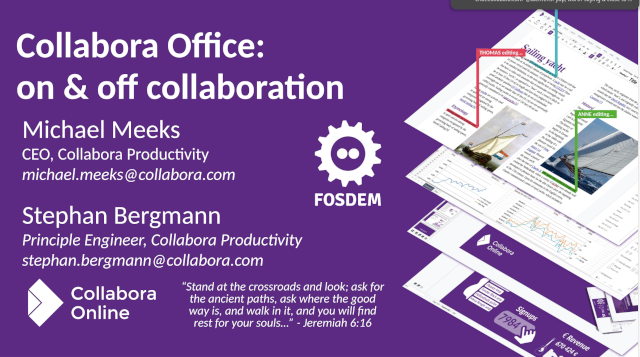-
 chevron_right
chevron_right
Allan Day: GNOME Foundation Update, 2026-02-06
news.movim.eu / PlanetGnome • 6 February 2026 • 4 minutes
Welcome to another GNOME Foundation weekly update! FOSDEM happened last week, and we had a lot of activity around the conference in Brussels. We are also extremely busy getting ready for our upcoming audit, so there’s lots to talk about. Let’s get started.
FOSDEM
FOSDEM happened in Brussels, Belgium, last weekend, from 31st January to 1st February. There were lots of GNOME community members in attendance, and plenty of activities around the event, including talks and several hackfests. The Foundation was busy with our presence at the conference, plus our own fringe events.
Board hackfest
Seven of our nine directors met for an afternoon and a morning prior to FOSDEM proper. Face to face hackfests are something that the Board has done at various times previously, and have always been a very effective way to move forward on big ticket items. This event was no exception, and I was really happy that we were able to make it happen.
During the event we took the time to review the Foundation’s financials, and to make some detailed plans in a number of key areas. It’s exciting to see some of the initiatives that we’ve been talking about starting to take more shape, and I’m looking forward to sharing more details soon.
Advisory Board meeting
The afternoon of Friday 30th January was occupied with a GNOME Foundation Advisory Board meeting. This is a regular occurence on the day before FOSDEM, and is an important opportunity for the GNOME Foundation Board to meet with partner organizations and supporters.
Turn out for the meeting was excellent, with Canonical, Google, Red Hat, Endless and PostmarketOS all in attendance. I gave a presentation on the how the Foundation is currently performing, which seemed to be well-received. We then had presentations and discussion amongst Advisory Board members.
I thought that the discussion was useful, and we identified a number of areas of shared interest. One of these was around how partners (companies, projects) can get clear points of contact for technical decision making in GNOME and beyond. Another positive theme was a shared interest in accessibility work, which was great to see.
We’re hoping to facilitate further conversations on these topics in future, and will be holding our next Advisory Board meeting in the summer prior to GUADEC. If there are any organizations out there would like to join the Advisory Board, we would love to hear from you.
Conference stand
GNOME had a stand during both FOSDEM days, which was really busy. I worked the stand on the Saturday and had great conversations with people who came to say hi. We also sold a lot of t-shirts and hats!
I’d like to give a huge thank you to Maria Majadas who organized and ran our stand this year. It is incredibly exhausting work and we are so lucky to have Maria in our community. Please say thank you to her!
We also had plenty of other notable volunteers, including Julian Sparber, Ignacy Kuchciński, Sri Ramkrishna. Richard Litteaur, our previous Interim Executive Director even took a shift on the stand.
Social
On the Saturday night there was a GNOME social event, hosted at a local restaurant. As always it was fantastic to get together with fellow contributors, and we had a good turnout with 40-50 people there.
Audit preparation
Moving on from FOSDEM, there has been plenty of other activity at the Foundation in recent weeks. The first of these is preparation for our upcoming audit. I have written a fair bit about this in these previous updates. The audit is a routine exercise, but this is also our first, so we are learning a lot.
The deadline for us to provide our documentation submission to the auditors is next Tuesday, so everyone on the finance side of the operation has been really busy getting all that ready. Huge thanks to everyone for their extra effort here.
GUADEC & LAS planning
Conference planning has been another theme in the past few weeks. For GUADEC, accommodation options have been announced , artwork has been produced, and local information is going up on the website.
Linux App Summit , which we co-organise with KDE, has been a bit delayed this year, but we have a venue now and are in the process of finalizing the budget. Announcements about the dates and location will hopefully be made quite soon.
Google verification
A relatively small task, but a good one to highlight: this week we facilitated (ie. paid for) the assessment process for GNOME’s integration with Google services. This is an annual process we have to go through in order to keep Evolution Data Server working with Google.
Infrastructure optimization
Finally, Bart, along with Andrea, has been doing some work to optimize the resource usage of GNOME infrastructure. If you are using GNOME services you might have noticed some subtle changes as a result of this, like Anubis popping up more frequently.
That’s it for this week. Thanks for reading; I’ll see you next week!





















